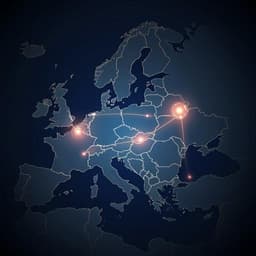
Political Science
Science diplomacy of Poland
M. Szkarłat
This article delves into the complex realm of Polish science diplomacy, revealing how domestic politics influence its effectiveness and strategic direction. Conducted by Monika Szkarłat from Maria Curie-Skłodowska University, the research highlights the potential for Poland to adopt more sophisticated systems, drawing comparisons with France and the Czech Republic.
~3 min • Beginner • English
Introduction
The paper examines science diplomacy (SD) as a relatively new dimension of diplomacy situated at the intersection of science/technology policy and foreign policy. It highlights persistent conceptual ambiguities around SD’s definition, actors, instruments and activities, noting its roots in broader discussions on new diplomacy and the evolving role of non-state actors. The study situates SD within international relations theory, contrasting mainstream realist views of diplomacy as state practice with critical and English School perspectives that broaden diplomatic actors and functions. It underscores that, despite long-standing practices that resemble SD, there is no universally accepted definition; for analytical clarity, SD is treated as involving state participation (distinguishing it from international scientific cooperation). The context motivating the study is the paucity of empirical analyses of SD in Central and Eastern Europe (CEE). The article aims to delineate Poland’s SD—its regulatory, institutional and operational frameworks, priorities and instruments—while comparing it with France and the Czech Republic. It posits that countries like Poland can benefit from experiences of more advanced systems, and argues that domestic politics significantly condition Poland’s SD, affecting continuity and coordination.
Literature Review
The article reviews strands of international relations and diplomacy scholarship to frame SD: realist and neorealist perspectives treating diplomacy as state-centered practice or instrument of foreign policy; English School conceptualizations of diplomacy as a primary institution of international society; and critical approaches questioning definitional essentialism and highlighting evolving practices. It discusses the expansion of diplomacy’s scope in the context of globalization, increasing roles for non-state actors, and the proliferation of issue-specific diplomacies (e.g., economic, digital, cultural, health). The paper surveys practitioner and scholarly attempts to conceptualize SD (e.g., RS/AAAS 2010; Turekian et al.; Gluckman et al.; Rungius), stressing the need to demarcate SD (requiring state involvement) from international scientific cooperation. It adopts Flink and Schreiterer’s typology of SD objectives (access, cooperation, influence) and notes underrepresentation of CEE cases in empirical SD literature, despite existing studies on higher education transformation in the region.
Methodology
The study employs a qualitative, theory-informed approach. The analytical framework draws on neoclassical realism and neoliberal institutionalism: external systemic factors interact with domestic variables (elite cohesion, regime vulnerability, internal political processes) to shape foreign policy choices, including SD. The authors interpret Poland’s SD as a bandwagoning strategy characteristic of revisionist states seeking to improve their international position in science, technology and innovation by aligning with higher-capacity partners. SD objectives are categorized using Flink and Schreiterer’s access–cooperation–influence triad, hypothesizing Poland’s emphasis on access and cooperation. Empirically, the study uses source document analysis (normative acts, strategies, policy and expert documents) and individual semi-structured interviews with key stakeholders: officials from the Ministry of Science and Higher Education (MNiSW), diplomats, executives from NAWA, NCN, NCBiR, representatives of the Polish Academy of Sciences (including PolSCA in Brussels, PAN stations in Paris), and scientists engaged in international cooperation. Comparative references with France and the Czech Republic provide context for Poland’s model. Interviews were conducted mainly in 2019 (some in early 2020 for Czech stakeholders) as part of ongoing research.
Key Findings
- Regulatory framework and objectives: Poland lacks a standalone, legally/politically binding SD strategy. SD-related goals are embedded in broader documents (e.g., Polish Foreign Policy Strategy 2017–2021; Directions for the promotion of Poland 2017–2027; Poland as a Brand). Objectives prioritize access and cooperation—improving access to research infrastructure, external funding (e.g., Horizon 2020), knowledge, and human resources; internationalizing Polish science; increasing Polish participation in international research teams and expert bodies; enhancing publication and grant performance. Influence-oriented goals are least developed and mostly indirect (e.g., representation in EU advisory bodies). - Institutional setup: Key top-down actors include the Ministry of Science and Higher Education (departments of International Cooperation, Innovation and Development, Science) and the Ministry of Foreign Affairs (MFA), supported by executive agencies: NAWA (internationalization of higher education/science), NCN (basic research), NCBiR (applied research), and the EU National Contact Point network. The Inter-ministerial Team for the Promotion of Poland Abroad (est. 2016) and its task teams (including scientific/educational promotion) were dissolved, creating uncertainty about implementation of prior strategic documents. Within MFA, SD sits under Public and Cultural Diplomacy; there is a science and technology advisor to the Foreign Minister (since 2017). Some embassies have science roles (e.g., Washington, Tokyo), and six scientific attaché offices were reportedly planned. Bottom-up actors—universities, PAN (with foreign stations and PolSCA), the Foundation for Polish Science, NGOs, and individual scientists—play a dominant role in practice. - Operational practices: Activities emphasize facilitating international collaboration, supporting participation in EU programmes, engaging the Polish diaspora (brain gain), promoting Poland as a research venue, and building regional cooperation (V4, Baltic). PAN undertakes diplomacy for science and operates stations in Paris, Rome, Vienna, a Kyiv office, a Berlin research centre, PolSCA in Brussels, and PIASt for SSH. - Comparative perspective: France has a formal SD strategy (2013) and extensive SD infrastructure—5 scientific counsellors, 71 attachés, 70 junior officers across 62 countries; large footprints in the US (20), China (15), and EU (38); additional operators (Institut français, Campus France, Expertise France), and networks (French institutes, research institutes, archaeological missions, Campus France offices, Alliances françaises). Since 2010, France has an Ambassador delegate for STI. The Czech Republic created a Special Envoy for SD (2019) and deployed science attachés in Brussels, Washington, Tel Aviv, Taipei; it runs the Inter-Excellence programme to support international RDI cooperation. - Political conditioning: Domestic politics strongly condition Poland’s SD. The MFA has been marginalized and oriented toward historical diplomacy and diaspora-focused initiatives, limiting coherent SD coordination. The dissolution of inter-ministerial coordination structures undermined continuity. - Performance indicators: Poland’s participation in Horizon 2020 applications was 11,468 vs UK 71,241, Germany 68,090, Italy 67,414; success rate 9.91% (Cyprus 12.29%, Czech Republic 12.23%). Poland is a “moderate innovator” (EIS 2019); notable strengths include innovation-friendly environment (e.g., broadband penetration 2011: 77.8%, 2018: 233.3% relative to EU) and tertiary education levels; weaker indicators relate to doctoral graduates, international co-publications (improving from 23.7% to 47.0% relative), most cited publications (19.0% to 46.1%), and PCT patents (11.8% to 13.4%). - Strategic orientations: Stakeholders prioritize internationalization, learning and adopting organizational/legal best practices from advanced systems, focusing resources on disciplines with strong Polish capabilities (e.g., mathematics, physics, biotechnology), and increasing Polish representation in EU and international decision-making/expert bodies.
Discussion
The findings confirm the initial assumption that Poland’s SD is predominantly oriented toward access and cooperation rather than influence. By mapping policies and institutions and integrating stakeholder perspectives, the study shows that Poland’s early-stage SD is fragmented, bottom-up driven, and constrained by domestic political dynamics that hinder strategic continuity and inter-ministerial coordination. This configuration addresses the research question by explicating how internal variables (elite cohesion, policy priorities, administrative structures) mediate Poland’s response to external incentives to internationalize science and leverage SD. The comparative analysis illustrates different maturity levels: France’s comprehensive, influence-capable model; the Czech Republic’s rapidly institutionalizing, economy-linked model; and Poland’s nascent, cooperation-focused model. The significance lies in identifying levers for improvement—restoring coordination mechanisms, ensuring stable funding, professionalizing SD roles (e.g., attachés), and strengthening representation in international bodies—to enhance Poland’s ability to access resources, build networks, and eventually exercise influence consistent with scientific excellence and foreign policy goals.
Conclusion
The paper contributes an empirically grounded overview of Poland’s science diplomacy—its regulatory references, institutional architecture, operational activities, and stakeholder views—framed by international relations theory and a comparative lens. It shows that Poland’s SD prioritizes access to resources and cooperation to bridge development gaps in science, technology and innovation, while influence objectives remain underdeveloped. Domestic political factors have impeded sustained coordination and strategy implementation. Policy implications include the need to re-establish effective inter-ministerial coordination (with a stronger MFA role), stabilize and increase funding for internationalization instruments (NAWA, NCN, NCBiR), expand and professionalize SD capacities abroad (e.g., science attachés), and systematically increase Polish presence in international expert and decision-making forums. Future research should monitor the outcomes of ongoing higher education and science reforms, evaluate the effectiveness of SD instruments (e.g., diaspora programmes, attaché networks), and expand comparative analyses across CEE and EU to identify adaptable best practices.
Limitations
The study reflects an early stage of an ongoing research project and relies on qualitative document analysis and semi-structured interviews conducted mainly in 2019 (some in 2020), with interview transcripts available in Polish. Several strategic initiatives were in flux (e.g., dissolution of the Inter-ministerial Team for the Promotion of Poland Abroad), limiting certainty about implementation status. Outcome data for newer programmes (e.g., NAWA initiatives aimed at return migration/brain gain) were not yet available. The evolving reform of higher education and science (post-2018 changes) introduces additional uncertainty for assessing long-term SD structures and effects.
Related Publications
Explore these studies to deepen your understanding of the subject.







